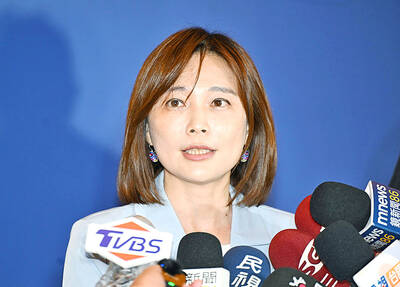A leading Chinese human rights lawyer who tried unsuccessfully to meet US President Barack Obama in Beijing last week was detained and interrogated twice during Obama’s visit to China, a US lawmaker and a US-based Chinese activist said.
Jiang Tianyong (江天勇) had returned to Beijing after giving testimony last week at a human rights hearing in Washington on allegations of China’s forced abortion practices.
Bob Fu, founder and president of China Aid, a US-based Christian group that promotes religious freedom and rule of law in China, said in an interview on Friday that Jiang told him that he was detained on Wednesday as he waited near the US embassy, hoping for an audience with Obama.
Obama was on an eight-day, four-nation tour of Asia in which global issues — nuclear disarmament, climate change, economic recovery — dominated.
Fu said Jiang told him that police also detained legal academic Fan Yafeng (范亞峰) and interrogated them for two hours. They were then brought home and told not to leave until Obama left Beijing.
Jiang also told Fu that he was detained on Thursday as he tried to bring his young daughter to school. He said police hit his wife when she came to see what was happening and that he was at the police station for nearly 14 hours before being released.
Fu said Jiang told him that his daughter was interrogated by police at her school.
US Republican Representative Chris Smith told reporters on Friday: “[Jiang] has been absolutely tenacious, and he’s now paying a price.”
China is known to round up and threaten lawyers, activists and others it considers troublemakers before and during important visits from foreign dignitaries. Other Chinese have reported being detained, harassed or confined to their homes during Obama’s four-day visit to China.
Jiang told the New York-based group Human Rights in China that Chinese police escorted him away from the US embassy area on Wednesday as he was trying to pursue a meeting with Obama.
He told the group police then picked him up on Thursday morning and questioned him for more than 13 hours before releasing him. He said police accused him of beating up a police officer.
An official at the Yangfangdian police substation, where Jiang has said he was taken and questioned, said yesterday he could not comment.
A telephone call to the propaganda office at Haidian police station, which oversees the substation, went unanswered.
Jiang recently defended a Tibetan Buddhist cleric against charges of concealing weapons in an area of China where anti-government protests occurred.
In his testimony in Washington on Nov. 10, Jiang said that many local family-planning officials in China illegally enforce population laws through compulsory abortion and surgical sterilization.

CALL FOR SUPPORT: President William Lai called on lawmakers across party lines to ensure the livelihood of Taiwanese and that national security is protected President William Lai (賴清德) yesterday called for bipartisan support for Taiwan’s investment in self-defense capabilities at the christening and launch of two coast guard vessels at CSBC Corp, Taiwan’s (台灣國際造船) shipyard in Kaohsiung. The Taipei (台北) is the fourth and final ship of the Chiayi-class offshore patrol vessels, and the Siraya (西拉雅) is the Coast Guard Administration’s (CGA) first-ever ocean patrol vessel, the government said. The Taipei is the fourth and final ship of the Chiayi-class offshore patrol vessels with a displacement of about 4,000 tonnes, Lai said. This ship class was ordered as a result of former president Tsai Ing-wen’s (蔡英文) 2018

UKRAINE, NVIDIA: The US leader said the subject of Russia’s war had come up ‘very strongly,’ while Jenson Huang was hoping that the conversation was good Chinese President Xi Jinping (習近平) and US President Donald Trump had differing takes following their meeting in Busan, South Korea, yesterday. Xi said that the two sides should complete follow-up work as soon as possible to deliver tangible results that would provide “peace of mind” to China, the US and the rest of the world, while Trump hailed the “great success” of the talks. The two discussed trade, including a deal to reduce tariffs slapped on China for its role in the fentanyl trade, as well as cooperation in ending the war in Ukraine, among other issues, but they did not mention

HOTEL HIRING: An official said that hoteliers could begin hiring migrant workers next year, but must adhere to a rule requiring a NT$2,000 salary hike for Taiwanese The government is to allow the hospitality industry to recruit mid-level migrant workers for housekeeping and three other lines of work after the Executive Yuan yesterday approved a proposal by the Ministry of Labor. A shortage of workers at hotels and accommodation facilities was discussed at a meeting of the legislature’s Transportation Committee. A 2023 survey conducted by the Tourism Administration found that Taiwan’s lodging industry was short of about 6,600 housekeeping and cleaning workers, the agency said in a report to the committee. The shortage of workers in the industry is being studied, the report said. Hotel and Lodging Division Deputy Director Cheng

TOKYO SUMMIT: The new Japanese PM’s words have demonstrated Japan’s ‘firm position on urging the prioritization of cross-strait peace,’ the foreign ministry said Minister of Foreign Affairs Lin Chia-lung (林佳龍) yesterday thanked US President Donald Trump and Japanese Prime Minister Sanae Takaichi for supporting peace in the Taiwan Strait, a day after the two at a summit in Tokyo emphasized the importance of regional stability and ahead of a meeting between Trump and Chinese President Xi Jinping (習近平) in South Korea today. The previous day’s meeting was the first time Takaichi had met with the US leader since becoming Japanese prime minister, the Ministry of Foreign Affairs said in a statement. Since taking office on Tuesday last week, Takaichi has urged the international community to